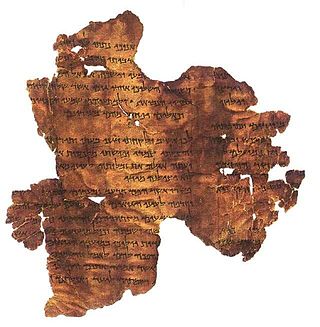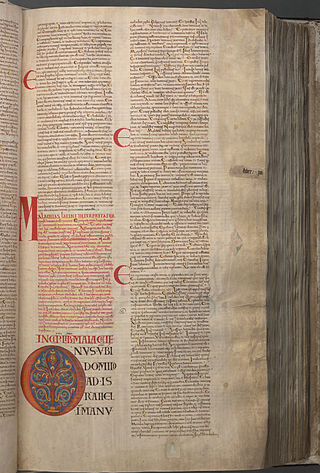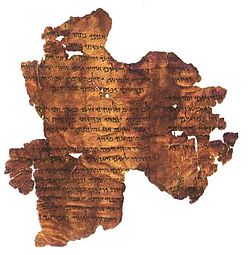
Hosea 1 is the first chapter of the Book of Hosea in the Hebrew Bible or the Old Testament of the Christian Bible. This book contains the prophecies attributed to the prophet Hosea son of Beeri, and this chapter especially sets forth the spiritual whoredom of Israel by symbolical acts. It is a part of the Book of the Twelve Minor Prophets.
Isaiah 49 is the forty-ninth chapter of the Book of Isaiah in the Hebrew Bible or the Old Testament of the Christian Bible. This book contains the prophecies attributed to the prophet Isaiah, and is one of the Books of the Prophets. Chapters 40-55 are known as "Deutero-Isaiah" and date from the time of the Israelites' exile in Babylon. This chapter includes the second of the songs of the "Suffering Servant".
Isaiah 5 is the fifth chapter of the Book of Isaiah in the Hebrew Bible or the Old Testament of the Christian Bible. This book contains the prophecies attributed to the prophet Isaiah, and is one of the Books of the Prophets.
Isaiah 9 is the ninth chapter of the Book of Isaiah in the Hebrew Bible or the Old Testament of the Christian Bible. This book contains the prophecies attributed to the prophet Isaiah, and is one of the Nevi'im.
Isaiah 28 is the twenty-eighth chapter of the Book of Isaiah in the Hebrew Bible or the Old Testament of the Christian Bible. This book contains the prophecies attributed to the prophet Isaiah and is one of the Books of the Prophets. The Jerusalem Bible groups chapters 28-35 together as a collection of "poems on Israel and Judah".
Isaiah 29 is the twenty-ninth chapter of the Book of Isaiah in the Hebrew Bible or the Old Testament of the Christian Bible. This book contains the prophecies attributed to the prophet Isaiah, and is a part of the Book of the Prophets. The Jerusalem Bible groups chapters 28-35 together as a collection of "poems on Israel and Judah".
Isaiah 34 is the thirty-fourth chapter of the Book of Isaiah in the Hebrew Bible or the Old Testament of the Christian Bible. This book contains the prophecies attributed to the prophet Isaiah, and is a part of the Book of the Prophets. The Jerusalem Bible groups chapters 28-35 together as a collection of "poems on Israel and Judah", although this chapter is addressed to all nations and to Edom in particular.

Isaiah 57 is the fifty-seventh chapter of the Book of Isaiah in the Hebrew Bible or the Old Testament of the Christian Bible. This book contains the prophecies attributed to the prophet Isaiah, and is one of the Books of the Prophets. Chapter 57 is the second chapter of the final section of the Book of Isaiah, often referred to as Trito-Isaiah.

Malachi 3 is the third chapter of the Book of Malachi in the Hebrew Bible or the Old Testament of the Christian Bible. This book contains the prophecies attributed to the prophet Malachi, and is a part of the Book of the Twelve Minor Prophets.

Hosea 2 is the second chapter of the Book of Hosea in the Hebrew Bible or the Old Testament of the Christian Bible. This book contains the prophecies attributed to the prophet Hosea son of Beeri and this chapter contains the application of the symbols in the first chapter. It is a part of the Book of the Twelve Minor Prophets.

Jeremiah 23 is the twenty-third chapter of the Book of Jeremiah in the Hebrew Bible or the Old Testament of the Christian Bible. This book contains prophecies attributed to the prophet Jeremiah, and is one of the Books of the Prophets.

Hosea 4 is the fourth chapter of the Book of Hosea in the Hebrew Bible or the Old Testament of the Christian Bible. This book contains the prophecies attributed to the prophet Hosea son of Beeri. In this chapter he reproves the people and priests for their sins in the interregnum following Jeroboam's death; hence there is no mention of the king or his family; and in Hosea 4:2 bloodshed and other evils usual in a civil war are specified. It is a part of the Book of the Twelve Minor Prophets.

Hosea 9 is the ninth chapter of the Book of Hosea in the Hebrew Bible or the Old Testament of the Christian Bible. This chapter contains the prophecies attributed to the prophet Hosea son of Beeri, about the distress and captivity of Israel for their sins, especially their idolatry. It is a part of the Book of the Twelve Minor Prophets.

Hosea 11 is the eleventh chapter of the Book of Hosea in the Hebrew Bible or the Old Testament of the Christian Bible. This chapter contains the prophecies attributed to the prophet Hosea son of Beeri, about God's former benefits, and Israel's ingratitude resulting in punishment, but God still promises restoration. It is a part of the Book of the Twelve Minor Prophets.

Hosea 12 is the twelfth chapter of the Book of Hosea in the Hebrew Bible or the Old Testament of the Christian Bible. This chapter contains the prophecies attributed to the prophet Hosea son of Beeri, and was delivered about the time of Israel's seeking the aid of the Egyptian king So, in violation of their covenant with Assyria. He exhorts them to follow their father Jacob's persevering prayerfulness, which brought God's favor upon him. As God is unchangeable, He will show the same favor to Jacob's posterity as He did to Jacob, if, like him, they seek God. It is a part of the Book of the Twelve Minor Prophets.

Jeremiah 2 is the second chapter of the Book of Jeremiah in the Hebrew Bible or the Old Testament of the Christian Bible. This book contains prophecies attributed to the prophet Jeremiah, and is one of the Books of the Prophets. Chapters 2 to 6 contain the earliest preaching of Jeremiah on the apostasy of Israel. Verses 2:1 to 3:5 dramatize the ending of "marriage" between Yahweh and Israel.

Ezekiel 23 is the twenty-third chapter of the Book of Ezekiel in the Hebrew Bible or the Old Testament of the Christian Bible. This book contains the prophecies attributed to the prophet/priest Ezekiel, and is one of the Books of the Prophets. This chapter forms part of a series of "predictions regarding the fall of Jerusalem", and is written in the form of a message delivered by God to Ezekiel. It presents an extended metaphor in which Samaria and Jerusalem are compared to sisters named Oholah (Samaria) and Oholibah (Jerusalem), who are the wives of God and accused of "playing the whore" in Egypt then cuckolding her husband while he watched.

Jeremiah 33 is the thirty-third chapter of the Book of Jeremiah in the Hebrew Bible or the Old Testament of the Christian Bible. It is numbered as Jeremiah 40 in the Septuagint. This book contains prophecies attributed to the prophet Jeremiah, and is one of the Books of the Prophets.

Jeremiah 30 is the thirtieth chapter of the Book of Jeremiah in the Hebrew Bible or the Old Testament of the Christian Bible. It is numbered as Jeremiah 37 in the Septuagint. This book contains prophecies attributed to the prophet Jeremiah, and is one of the Books of the Prophets. The Jerusalem Bible refers to chapters 30 and 31 as "the Book of Consolation", and Lutheran theologian Ernst Hengstenberg calls these two chapters "the triumphal hymn of Israel’s salvation". This chapter contains the promises to restoration.

2 Kings 10 is the tenth chapter of the second part of the Books of Kings in the Hebrew Bible or the Second Book of Kings in the Old Testament of the Christian Bible. The book is a compilation of various annals recording the acts of the kings of Israel and Judah by a Deuteronomic compiler in the seventh century BCE, with a supplement added in the sixth century BCE. This chapter records Jehu's massacres of the sons of Ahab, the kinsmen of Ahaziah the king of Judah and the Baal worshippers linked to Jezebel. The narrative is a part of a major section 2 Kings 9:1–15:12 covering the period of Jehu's dynasty.







